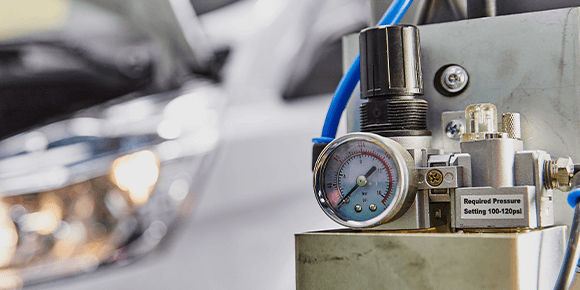
NITROGEN INFLATION
Nitrogen Inflation helps to keep your tyres at their correct pressure for longer. Please note that the price stated for Nitrogen Inflation applies per tyre.
You know you should check your tyre pressure regularly, but why?
Filling your tyres with nitrogen instead of compressed air means that your tyre pressure will remain at the appropriate threshold for longer because the rate at which Nitrogen passes out the walls of your tyres is slower than oxygen.
Our machine pulls nitrogen from the air, cleans and purifies it, and then gets pumped into your tyres. Once you have nitrogen in your tyres, ideally you should keep the pressure topped up using nitrogen to a minimum of 95%. If you need to top up using compressed air, this is fine but it will dilute the nitrogen content in the tyres.
You should check your tyre pressure regularly. Correct tyre pressures mean that your tyres grip the road as they should. Incorrect tyre pressures can cause unnecessary wear on your tyres, meaning they could wear unevenly and may lead to premature replacement of your tyres.
Low tyre pressures can mean that your tyre creates more resistance to movement. This means that more energy is required to move your car, which equates to a higher fuel consumption. Inevitably, maintaining your tyres at the correct pressure could help save you money on fuel and reduce the amount of CO2 you produce from your vehicle.
Why does my tyre lose pressure?
The composition of a tyre means that gas and moisture inside the tyre will seep out - rubber is a porous material. Compressed air contains oxygen, water and nitrogen in different mixes. A tyre filled with compressed air can lose between 1 and 3 psi per month.
Why Choose Nitrogen Inflation?
The composition of a tyre means that gas and moisture inside the tyre will seep out; this is because rubber is a porous material. Compressed air contains oxygen, water and nitrogen in different mixes. A tyre filled with compressed air can lose between 1 and 3 psi per month, whereas tyres filled with nitrogen will lose less than 3/4s of that amount.
Temperature
When the temperature of rubber in a tyre increases the water vapour found within the air inside, the tyre reacts and causes the rubber to expand. Temperature change has little or no effect on pure nitrogen molecules as it contains no water vapour. This keeps the tyre pressure constant when in motion and ensures the correct amount of tyre is in contact with the road.
Moisture
Compressed air within tyres contains water vapour. Over time, this can cause the inner wheel rim to rust. Nitrogen contains no water vapour and prevents this rust build-up. In a passenger car, the effects of this aren't seen until after many years; the effects of moisture content are more important to commercial vehicles.
In order to get the optimum performance from your tyres, the nitrogen content in your tyres should be above 95%.

